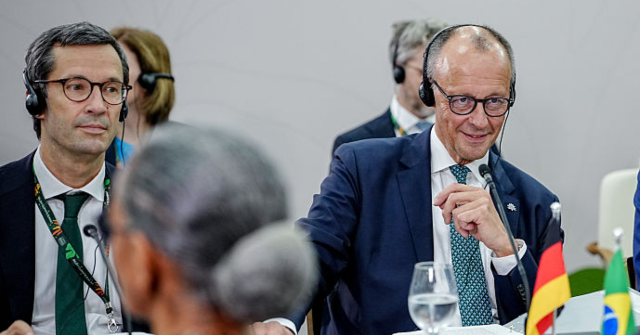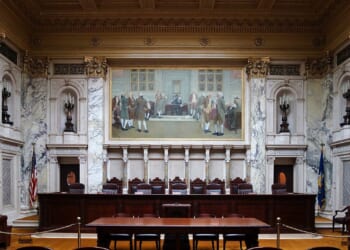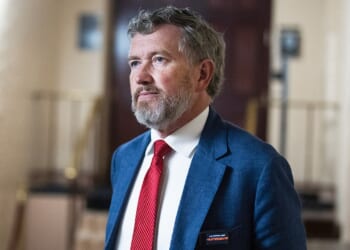A severe shortage of adequate lodging offerings in the Brazilian city of Belém prompted local “love” motels, designed to accommodate brief sexual trysts, to adjust their raunchy facilities to house diplomats and participants of the ongoing COP30 climate alarmism summit, CNN and other outlets reported.
The love motels reportedly removed erotic imagery, chairs, and sex toys from their facilities, with at least one such motel painting over its erotic murals with Amazon Rainforest imagery.
Brazil is hosting the 30th edition of the United Nations’ COP climate alarmist summit in Belém, a city in the state of Pará close to the Amazon Rainforest. The event, which started this week, will run through November 21.
Throughout the year, the Brazilian government scrambled to prepare Belém’s infrastructure ahead of the event — going as far as to reportedly decimate thousands of acres of the Amazon Rainforest to make way for a new highway to improve Belém’s traffic routes for the global gathering. The Brazilian government also granted credit lines for the construction of new hotels in the city to expand its lodging capacity.
Despite the government’s preparations, the event reportedly faces several logistical complications, of which Belém’s severe lack of hotel room offerings stands as the most significant. In late July, at least 25 countries unsuccessfully pressured Brazil to relocate COP30 to another city, citing an inability to secure lodging for their respective delegations due to “exorbitant” prices. The situation prompted local private hotels to capitalize on the overwhelming demand, rebranding their hotels with COP30-related imagery and increasing room rates by as much as 100 times.
According to CNN, Belém was not set up to receive an influx of 50,000 COP30 participants with its 18,000 available hotel rooms. One unnamed head of a negotiating delegation stated that “they were being charged more than $20,000 for two weeks in a three-bedroom apartment.”
In light of the drastic lack of room availability, love hotels, which are common in Brazil, adjusted their infrastructure to accommodate diplomats in rooms normally used for rapid sexual escapades. Ricardo Teixeira, owner of “Love Lomas,” one such sex hotel in Belém, explained to CNN how he is planning to tone down some of the rooms’ erotic chairs and the sale of sex toys in the hotel.
BBC News Brasil reported that the “Pure Pleasure” love hotel chose to lodge European and African COP30 participants. The hotel is located in the municipality of Marituba, a 45-minute drive from Belém, and is near the banks of a highway that connects to Parque da Cidade, the urban park where COP30 is presently taking place. According to the BBC, the hotel is experiencing “the best phase in its history” despite its location ever since it was established in 2003 as a stopover for Belém-bound truck drivers looking to spend the night having sex.
The hotel, which is offering shuttle van services to its COP30 guests, repainted its exterior walls, replacing erotic imagery with imagery reminiscent of the Amazon Rainforest, featuring paintings of macaws, jaguars, and toucans.
“It’s like a rubber cycle,” Cristiano Ribeiro, owner of the love motel, told BBC, comparing the situation to Belém’s rubber trees exploitation economic boom in the early 20th century.
Ribeiro detailed that he purchased beds, towels, sheets, and hot tubs for the renovations of his love hotel which, he said, will allow COP30 participants to “relax while writing their reports.” The hotel owner explained that he also invested in maid and kitchen staff training. The BBC reported that the hotel’s walls no longer feature “sadomasochistic paintings suggesting eroticism with mouths” and erotic chairs designed to facilitate a variety of sexual positions were removed from the premises.
“Here in Belém, we are now following the trend of new motels, including rooms that are not erotic in nature and are more comfortable,” Ribeiro said. “Now, it will be geared toward couples who want something different in their relationship. Those who want something better than what they find at home.”
The BBC reported that “Acropolis Inn,” another love hotel located in downtown Belém, changed the colors of its external facade from red to gray, and removed a slogan in Portuguese that read, “Come and bring your love.” Ceiling mirrors in the raunchy rooms were removed and the hotel’s staff prepared for long-term guests.
“We are transitioning to become more of a hotel, with a different footprint,” Alberto Braga, the hotel’s owner, told the BBC, and pointed out that four Dutch guests booked rooms for the duration of COP30.
In an effort to alleviate the severe lodging shortages and high costs, the Brazilian government offered lower rates to “least developed countries,” free cabins aboard cruise ships, and worked alongside French accommodation specialist networks to set up a website for COP30 attendees to browse and book rooms with prices ranging from $200 a night to more than $1,000. According to CNN, most of the offerings on the site require “minimum stays of 11 nights.”
Instead of staying at a conventional hotel, President Lula da Silva and his delegations are staying in a rented boat with hotel-like facilities that, according to the Brazilian outlet Poder 360, will consume at least 4,000 liters of diesel fuel throughout the climate alarmist event. Despite the severe hotel room shortages and other logistic issues, Lula claimed this week that COP30 will be “the best ever” in remarks given to international reporters.
“When we decided to hold COP here in the state of Pará, we were already aware of the conditions in the state, we already knew about the conditions in the city… And we decided to hold it here because we didn’t want comforts, we wanted challenges. And we wanted the world to come and see the Amazon,” Lula reportedly said.
Christian K. Caruzo is a Venezuelan writer and documents life under socialism. You can follow him on Twitter here.


















